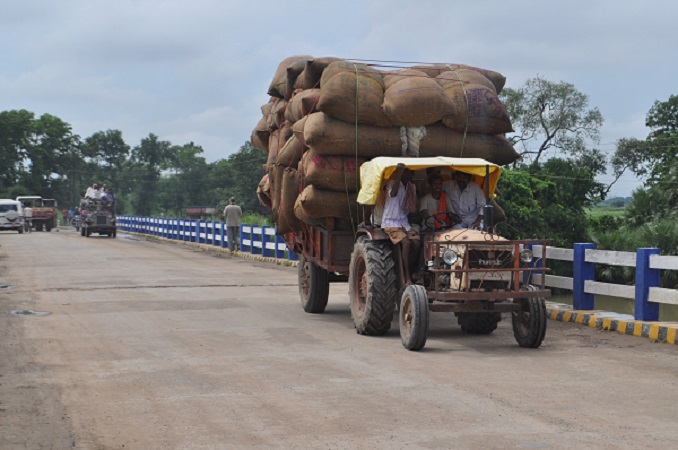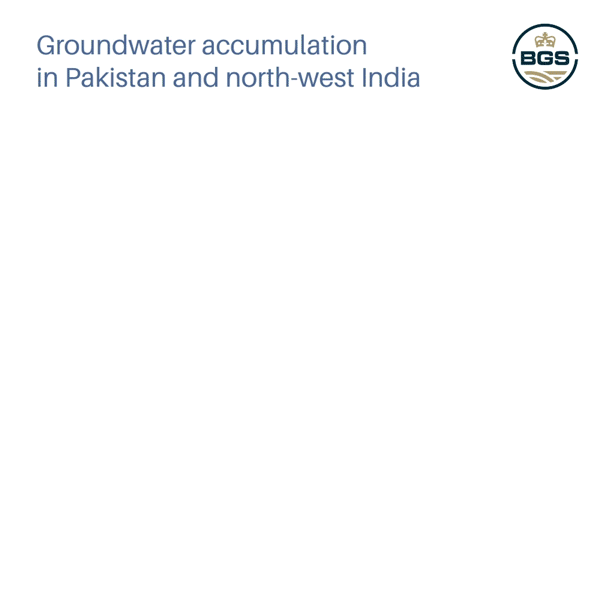Hidden from view: a century of rising groundwater levels in India and Pakistan
Groundwater storage increased in Pakistan and north-west India for most of the 20th century, a new study shows. So why is there a water crisis?
22/04/2022 By BGS Press
Pakistan and north-west India are facing a severe groundwater crisis with levels falling year on year, yet for the vast majority of the last century, groundwater levels were actually rising, according to new research.
As the world prepares to mark Earth Day (22 April 2022), there is significant concern among scientists about the groundwater systems of north-west India and central Pakistan, which are now among the most heavily exploited in the world.
Groundwater levels have been declining in South Asia for the better part of the last two decades due to extraction for irrigation, particularly in vital agricultural areas of north-west India and central Pakistan, which are known as the region’s bread baskets.
Estimates suggest that groundwater is used in over 75 per cent of irrigated areas in South Asia. Globally, agriculture accounts for more than 70 per cent of global water supply withdrawals.
But it hasn’t always been this way. In a study published in Nature, hydrogeologists at BGS, together with partners from the National Institute of Hydrology in India and the Pakistan Water and Power Development Authority, traced more than 100 years of change in groundwater levels in central Pakistan and north-west India from 1900–2010 and found that, for the majority of the 20th century, groundwater levels were rising.
Scientists believe the development of a vast network of canals in the early to mid-20th century played a defining role in contributing to rising groundwater levels. The study goes on to reveal that, even when large increases in borehole irrigation began in the 1970s, groundwater levels remained broadly stable in the region. Despite being the start of an unprecedented period of borehole development, when boreholes (better known as tubewells in the region) were drilled to extract water from aquifers beneath the ground, groundwater levels stabilised as a result of higher than average rainfall.
However, more recently, the rate of borehole drilling has proved unsustainable. Evidence shows that the turn of the 21st century marked the start of a decade of rapid decline in groundwater levels. Low rainfall and increased rates of borehole drilling for agriculture during the first decade of the 21st century had a detrimental effect on groundwater storage, a trend that continues today.
This study provides evidence of how significant human impact has been on groundwater resources over a very long period of time.
Human-driven interventions have had both positive and negative impacts over the last century, however unintended they may have been.
Whilst canals contributed to an accumulation of groundwater in the early 1900s, ironically they also paved the way for large-scale and unsustainable use of groundwater for irrigation in the latter half of the 20th century.
Pakistan and India now have some of the most heavily exploited groundwater systems on Earth and depleting levels of available water are becoming a major challenge. Human-led extraction, climate change and pollution will continue to heap pressure on groundwater systems around the world.
Dr Donald John MacAllister, BGS Hydrogeologist who led the study.
Whilst the outlook for the future is uncertain, looking at the long-term impact of historical developments on groundwater in the region could help to provide answers.
This study shows that canals may be a part of the solution going forward, but we urgently need more research to understand the long-term implications of groundwater depletion. Continuous monitoring of groundwater levels, such as that conducted by the Central Groundwater Board (CGWB) in India, will also help to better understand how much water is available and how best to use it.
For example, it could be that canals are left unlined to continue to recharge groundwater, or farmers might revert to using canal water as the main source of irrigation in some areas, allowing groundwater to recharge.
Dr Gopal Krishnan, National Institute of Hydrology, co-author of the study.
Although the implications of our study are quite nuanced and changes in groundwater levels vary greatly across the region, they illustrate the importance of the connection between surface water and groundwater resources and the need for integrated management of water resources.
Dr Muhammed Basharet, Pakistan Water and Power Development Authority, co-author of the study.
Our results illustrate how humans have impacted groundwater resources over a very long period of time in one of the world’s most heavily exploited aquifer systems and the importance of canals as a source of groundwater recharge in the region.
More investment is needed in mapping and monitoring of the Earth’s subsurface to determine where groundwater is not only available but can also be extracted in a sustainable and economical way. Mobilising hydrogeologists, water resource managers and engineers will help to shape better groundwater governance and help improve resource sustainability.
Donald John MacAllister
Notes to editor
- The full study can be found at https://www.nature.com/articles/s41561-022-00926-1
- North-west India and Pakistan Punjab are known in each country as breadbaskets. The breadbasket of a country or of a region is an area that, because of the richness of the soil and/or advantageous climate, produces large quantities of wheat or other grain
- Many irrigation canals, which were designed to transport water to cropland, are unlined. Leakage from the canals can be beneficial as it contributes to levels of regional ground water recharge, when seepage helps to replace water levels in natural aquifers in the rock
Shah, T, Singh, O P, and Mukherji, A. 2006. Some aspects of South Asia’s groundwater irrigation economy: analyses from a survey in India, Pakistan, Nepal Terai and Bangladesh. Hydrogeology Journal, Vol. 14, 286–309. DOI: https://doi.org/10.1007/s10040-005-0004-1
Siebert, S, Burke, J, Faures, J M, Frenken, K, Hoogeveen, J, Döll, P, and Portmann, F T. 2010. Groundwater use for irrigation — a global inventory. Hydrology and Earth System Sciences, Vol. 14, 1863–1880. DOI: https://doi.org/10.5194/hess-14-1863-2010





